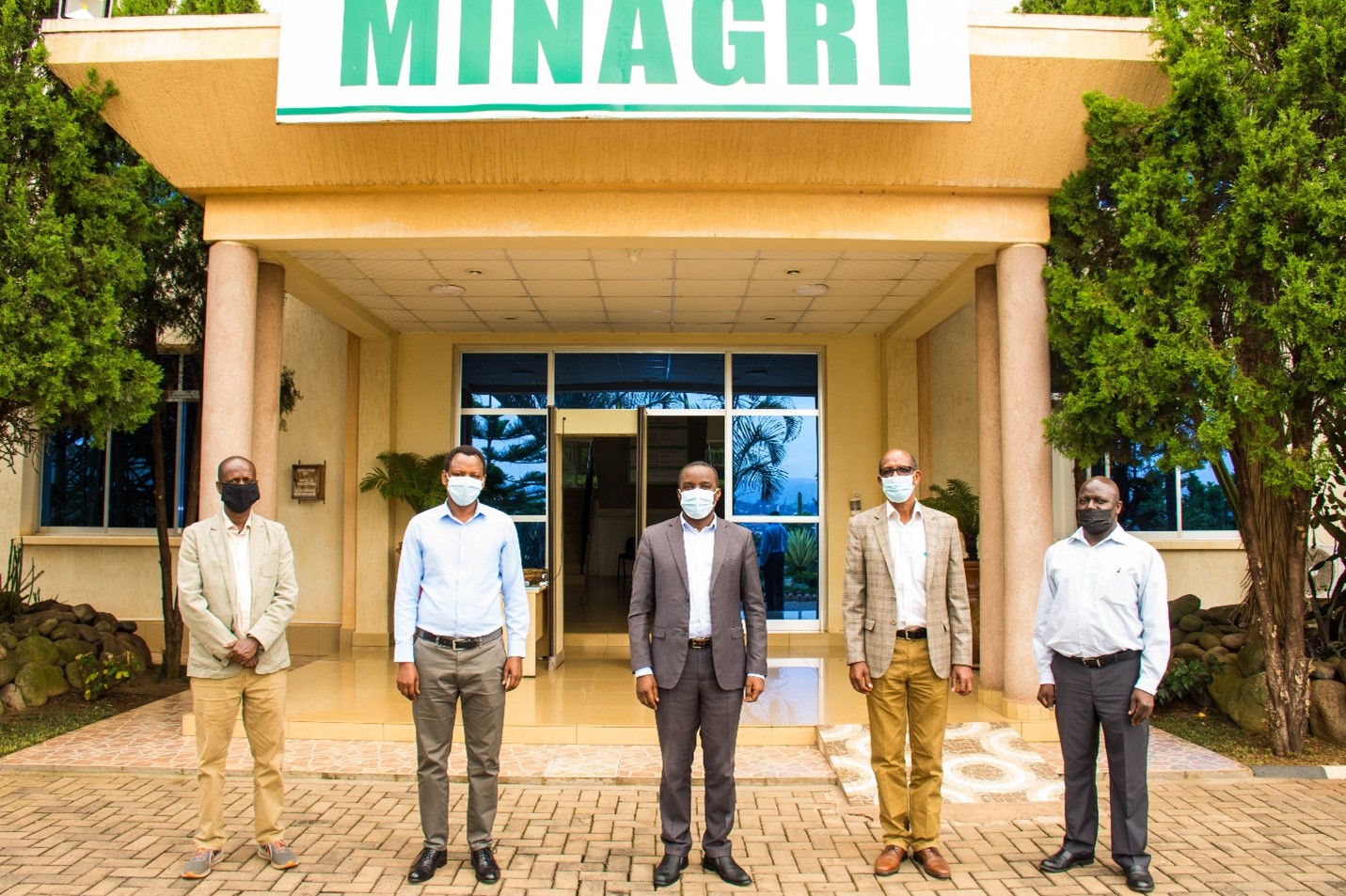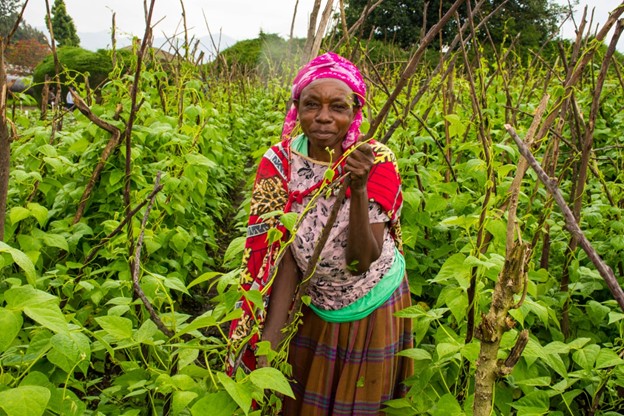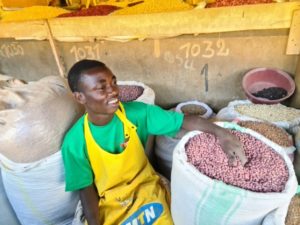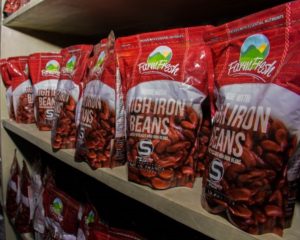By Edouard Rurangwa, Owen Kimani, Patricia Onyango, Jean-Claude Rubyogo, Eliud Birachi, and Teshale Mamo
In Rwanda, beans are the main staple food providing households with 32% of required calories and 65% of protein across the country. Rwandans have the highest per capita bean consumption in the world, with an estimated per capita bean consumption of around 164 grams/day. Though beans remain a major staple food crop, they are also the most important source of revenue for farmers. In Rwanda, both bush and climbing beans are widely grown across the country. Climbing beans (photo 1) grow vertically making them a crop with great potential in densely populated areas, where agricultural land is limited. The climatic condition is also suitable for growing beans. However, productivity by most farmers remains low and thus affects their food security and incomes.
The Director-General of Rwanda Agriculture and Animal Resources Development Board (RAB), Dr. Patrick Karangwa met the delegation from the Alliance of Bioversity International & CIAT within the framework of the Pan-Africa Bean Research Alliance (PABRA). The Alliance delegation included Jean Claude Rubyogo, Bean Programme Leader and Director, PABRA, Dr. Eliud Birachi, Market Development Specialist, and Dr. Teshale Mamo, Bean Breeder and Coordinator Eastern and Central Africa Bean Research Network. They were accompanied by Dr. Edouard Rurangwa, Coordinator, Pulses and Oil Crops Programme at RAB (see Photo 2).

Photo 2: From left Dr. Teshale Mamo, Dr. Edouard Rurangwa, Dr. Patrick Karangwa, Jean Claude Rubyogo, and Dr. Eliud Birachi
Discussions were centered on strengthening the existing partnership to increase bean productivity and marketing for the benefit of small-holder farmers, particularly women, youth, and consumers.
Currently, the average climbing bean productivity in the country is less than 2 tons per hectare while its potential is more than 4 tons/ha. On the other hand, the bush bean has a potential of more than 2 tons per hectare, but the current yields are only about 0.8 tons/ha. RAB seeks to raise the productivity of beans to meet the growing food and nutrition demands and improve the incomes of smallholders while upgrading the bean value chains for all actors.
Through this partnership, RAB and the Alliance of Bioversity International & CIAT (the Alliance) through PABRA are working together to strengthen bean research in Rwanda and to catalyze farmers to produce more beans for food and nutrition security as well as for the domestic and export markets while creating business and employment opportunities for women and youth (see Photo 3).
PABRA seeks to use the proven demand-led research experiences based on the bean corridor approach (Bean corridors: A novel approach to scale up national and regional trade in Africa (cgiar.org) that worked successfully in Ethiopia. In Ethiopia, through PABRA, the Ethiopian Institute of Agricultural Research (EIAR) and seed value chain actors accelerated farmers’ access to new varieties from 1% to 75% in the last two decades. Improved bean crop management and better supplies of quality seed have helped double yields from 0.7 to 1.6 tons per hectare while the export of white pea bean increased 20 times from USD 8 million to 160 million and the number of exporters increased from 2 to more than 400. Joint research will be undertaken to assess and understand the consumer/market demanded varieties, development of demand-led and climate-resilient varieties, information on the right agronomical practices to achieve the right grain and seed volumes for the market, and capacity building for farmers and value chain actors on the right varieties to grow. This will in turn attract other bean value chain actors such as grain off-takers and processors who are keen to invest and be part of inclusive bean value chains for providing quality nutritious beans. This will spur farmers’ investments in their bean production by use of quality seeds and post-harvest management.
“This new way of doing research will build on the existing excellent partnership between RAB and the Alliance bean research programmes and expand to other value chain actors – we are delighted to continue partnering with the Alliance’’ said Dr. Karangwa.
One of the key ingredients that could accelerate the production and increase the marketing of seeds and grain is a collaboration with farmer cooperatives. This is slowly taking shape as seed aggregators find it easy to locate at central points for seed collection from and to the farmers. In so doing, farmers from the cooperatives can access the new bean varieties that are on-demand in the market, thus producing seeds for the market. Farmer groups get involved in input supply, extension, and marketing while collaborating closely with key grain off-takers and processors. These groups have the potential to become an important vehicle for increased production and marketing of beans in Rwanda.
Researchers will enable the private sector to invest in beans by conducting research on the key market drivers to inform the farmers on the right bean varieties for the market.
“There is a great potential for bean productivity in Rwanda, but all the actors need to be coordinated and we must synchronize the grain and seed production to respond the consumer demand”, said Jean-Claude Rubyogo, Director, PABRA
In June 2021, RAB released 19 new bean varieties that included 13 climbing beans and 6 bush beans. Among them, eight were high in iron and zinc content while the remaining were high-yielding varieties with good production and high market preferences.
Ensuring adequate seed multiplication and marketing will be a major step in making the bean value chain sustainable and inclusive. Several Rwandan seed companies are emerging, indicating a good sign for bean producers. e.g., NZAYALEX Co Ltd; Seeds of Trust, RISCO, DERN, Tri-seeds, IGNITE Seed Co Lt. Etc. Value addition is also picking up with companies such as Farmfresh Ltd packaging pre-cooked beans for the export markets (see photo 4). The Bean grain export market is also emerging.
Various bean-based products are winning the hearts of not only the locals but also the regional market. The international market is an opportunity that if tapped, will increase demand for these processed bean-based products as well as quality grains that will increase bean business and create jobs and employment opportunities for women and youth in Rwanda.
Dr. Karangwa concluded that the Government of Rwanda is supportive of the impactful partnership between RAB and Alliance’s Bean Programmes through PABRA. The investments by development partners to improve the bean value chain in Rwanda by Australian Centre for International Agricultural Research (ACIAR), Africa Green Revolution Alliance (AGRA), Bill & Melinda Gates Foundation ( BMGF) Global Affairs Canada (GAC), Swiss Agency for Development & Corporation (SDC), and, United States Agency for International Development (USAID) among others were also highly appreciated.



